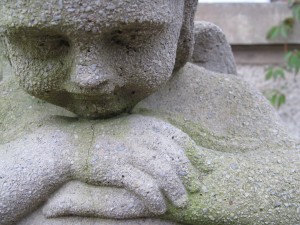“I cannot help but be cautious about structural power in the context of a kingdom that routinely “flips the script.”
I get it. Really I do. I have close friends who have known untold pain because they have been denied the opportunity to use their gifts and exercise their callings within official capacities in the church. When I worked as a hospital chaplain, I myself was kicked out of a hospital room or two simply based on my gender alone. The passages of Scripture addressing these issues in the church are difficult and the traditional readings longstanding. I get why we are having these conversations wrestling with a woman’s place within the structure of the church. (Thanks be to God for thoughtful discourse!)
At the same time, a part of me is uncomfortable with all this talk about titles of importance. If we are not careful, we might end up sounding like the disciples arguing over who would be at Jesus’ right hand when the kingdom comes. Not their most flattering moment.
This week, I am in Beaumont for my usual spiritual direction appointments and also attending a week of Scripture study with Sr. Carol Perry from Marble Collegiate Church. As we were making our way through the beatitudes, Sr. Carol used the parable of the sheep and goats (Matthew 25: 31ff ) to illustrate meekness. One historical contextual detail she shared was that in the ancient world, goats were seen as much more valuable than sheep. The goats were resourceful and could find pasture on their own and ate such a wide variety of things that they were easy to feed. Sheep on the other hand were needy and stupid, in constant need of care and leadership. Often the goats led the sheep. So it is no surprise that the religious leaders of the day saw themselves as the “goats” of Israel, proud leaders of the many sheep.
Into that reality Jesus spoke this surprising twist in his story: the sheep, not the goats, were those valued and rewarded by the master. You can almost hear his disciples gasping. Jesus “flipped the script.”
When Sr. Perry was teaching this parable yesterday, I immediately thought about this conversation about women in leadership. I know in many ways this conversation is about justice and fullness of service in the kingdom, but I cannot help but be cautious about structural power in the context of a kingdom that routinely “flips the script.” Are we asking to be goats?
And here I feel a bit caught. Structural injustice is not to be applauded. At the same time, in a faith that regularly flips the script, how much is gained by titles and structural authority? It all makes me dizzy when I try to figure it out in terms of concept and precept. But then when I turn back to stories, I don’t try to make sense of it as much as look at what feels most like the winsome good news of God.
As I wrote last week, I am drawn to how these women made their way in the world in powerfully loving ways quite apart from structural power of any kind. So effectively in fact, that (gasp) I am wondering if in some situations something important might be lost in the context of structural power gained.
For instance, I love the insights Rachel Held Evans offered about Ruth, the observation that it is character, not roles that matter. Interestingly, one of the parts of this story that makes it so attractive to me is the fact that Ruth and Naomi were not a part of the official powers that be. They were poor women who had suffered enormous loss and who were simply trying to survive the best they could. To the casual observer, Ruth did not love in out-of-the-ordinary, strategic, or dramatic ways, but with small kindnesses and fierce loyalty. I just love the way this script flips in the final moments of the book when the writer reveals that these peasant women were the fore-mothers of King David.
There is something inherently hopeful about the subtle brilliance of Ruth’s “untitled” power in this story. It shows me the way that personal acts of kindness and loyalty are regarded in God’s alternate economy. It gives me sight to see the power of a casserole to a family in grief or the healing force of a knowing hug or simple text message inquiry about a hurting friend’s day. Or as Jesus said, “For I was hungry and you gave me something to eat, I was thirsty and you gave me something to drink, I was a stranger and you invited me in, I needed clothes and you clothed me, I was sick and you looked after me, I was in prison and you came to visit me.” It re-orients me to the power of love in each moment of my day no matter how I might or might not be regarded by conventional wisdom systems or an institution.
So, for those called to lead, I wish for you the freedom to lead in fullness, with and without the recognition of the structures in which you walk. At the same time, from somewhere in the back corner of the room, I find myself wanting to cheer, “Let’s hear it for the sheep, too!”














